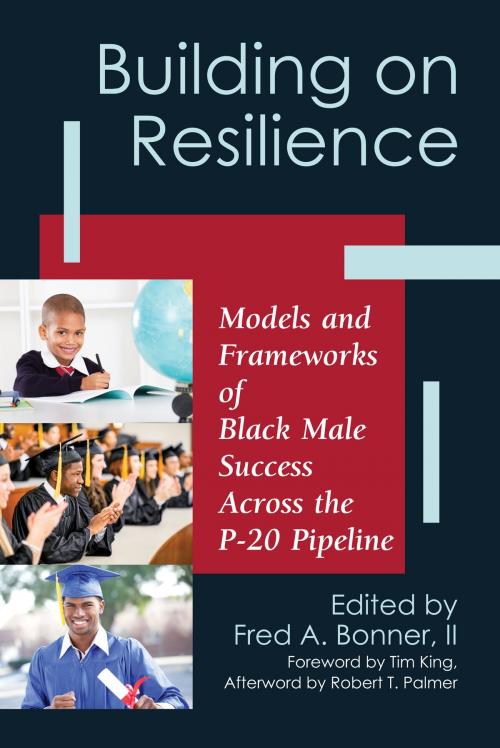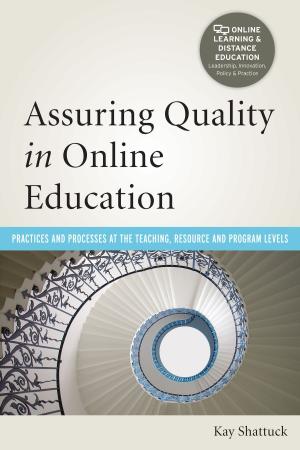Building on Resilience
Models and Frameworks of Black Male Success Across the P-20 Pipeline
Nonfiction, Reference & Language, Education & Teaching, Educational Theory, Multicultural Education, Higher Education| Author: | ISBN: | 9781579229641 | |
| Publisher: | Stylus Publishing | Publication: | June 19, 2015 |
| Imprint: | Stylus Publishing | Language: | English |
| Author: | |
| ISBN: | 9781579229641 |
| Publisher: | Stylus Publishing |
| Publication: | June 19, 2015 |
| Imprint: | Stylus Publishing |
| Language: | English |
How do we fix the leaky educational pipeline into a conduit of success for Black males?
That the issue is critical is demonstrated by the statistics that only 10% of Black males in the United States are proficient in 8th grade reading, only 52% graduate from high school within four years, and only 35 percent graduate from college.
This book uniquely examines the trajectory of Black males through the educational pipeline from pre-school through college. In doing so it not only contributes significantly to the scholarship on the experiences of this population, but bridges the gap between theory and practice to provide frameworks and models that will improve these young men’s educational outcomes throughout their educational journeys.
A compelling feature of the book is that that it does not treat Black males as homogeneous, but recognizes the diversity that exists among Black males in various educational settings. It demonstrates the need to recognize students’ intersectionalities and individual characteristics as an essential preliminary to developing practices to improve outcomes at every educational stage.
Throughout, the contributing authors also focus on the strategies and experiences of Black males who achieve academic excellence, examining growth-producing and asset-based practices that can be sustained, and that build upon the recognition that these males have agency and possess qualities such as resilience that are essential to their learning and development.
The frameworks and models that conclude each chapter will commend this book as much to K-12 educators and administrators, and to higher education faculty, student affairs practitioners and administrators, as to policymakers for whom it provides template for rectifying the continuing inequities of our educational system.
That the issue is critical is demonstrated by the statistics that only 10% of Black males in the United States are proficient in 8th grade reading, only 52% graduate from high school within four years, and only 35 percent graduate from college.
This book uniquely examines the trajectory of Black males through the educational pipeline from pre-school through college. In doing so it not only contributes significantly to the scholarship on the experiences of this population, but bridges the gap between theory and practice to provide frameworks and models that will improve these young men’s educational outcomes throughout their educational journeys.
A compelling feature of the book is that that it does not treat Black males as homogeneous, but recognizes the diversity that exists among Black males in various educational settings. It demonstrates the need to recognize students’ intersectionalities and individual characteristics as an essential preliminary to developing practices to improve outcomes at every educational stage.
Throughout, the contributing authors also focus on the strategies and experiences of Black males who achieve academic excellence, examining growth-producing and asset-based practices that can be sustained, and that build upon the recognition that these males have agency and possess qualities such as resilience that are essential to their learning and development.
The frameworks and models that conclude each chapter will commend this book as much to K-12 educators and administrators, and to higher education faculty, student affairs practitioners and administrators, as to policymakers for whom it provides template for rectifying the continuing inequities of our educational system.
How do we fix the leaky educational pipeline into a conduit of success for Black males?
That the issue is critical is demonstrated by the statistics that only 10% of Black males in the United States are proficient in 8th grade reading, only 52% graduate from high school within four years, and only 35 percent graduate from college.
This book uniquely examines the trajectory of Black males through the educational pipeline from pre-school through college. In doing so it not only contributes significantly to the scholarship on the experiences of this population, but bridges the gap between theory and practice to provide frameworks and models that will improve these young men’s educational outcomes throughout their educational journeys.
A compelling feature of the book is that that it does not treat Black males as homogeneous, but recognizes the diversity that exists among Black males in various educational settings. It demonstrates the need to recognize students’ intersectionalities and individual characteristics as an essential preliminary to developing practices to improve outcomes at every educational stage.
Throughout, the contributing authors also focus on the strategies and experiences of Black males who achieve academic excellence, examining growth-producing and asset-based practices that can be sustained, and that build upon the recognition that these males have agency and possess qualities such as resilience that are essential to their learning and development.
The frameworks and models that conclude each chapter will commend this book as much to K-12 educators and administrators, and to higher education faculty, student affairs practitioners and administrators, as to policymakers for whom it provides template for rectifying the continuing inequities of our educational system.
That the issue is critical is demonstrated by the statistics that only 10% of Black males in the United States are proficient in 8th grade reading, only 52% graduate from high school within four years, and only 35 percent graduate from college.
This book uniquely examines the trajectory of Black males through the educational pipeline from pre-school through college. In doing so it not only contributes significantly to the scholarship on the experiences of this population, but bridges the gap between theory and practice to provide frameworks and models that will improve these young men’s educational outcomes throughout their educational journeys.
A compelling feature of the book is that that it does not treat Black males as homogeneous, but recognizes the diversity that exists among Black males in various educational settings. It demonstrates the need to recognize students’ intersectionalities and individual characteristics as an essential preliminary to developing practices to improve outcomes at every educational stage.
Throughout, the contributing authors also focus on the strategies and experiences of Black males who achieve academic excellence, examining growth-producing and asset-based practices that can be sustained, and that build upon the recognition that these males have agency and possess qualities such as resilience that are essential to their learning and development.
The frameworks and models that conclude each chapter will commend this book as much to K-12 educators and administrators, and to higher education faculty, student affairs practitioners and administrators, as to policymakers for whom it provides template for rectifying the continuing inequities of our educational system.















